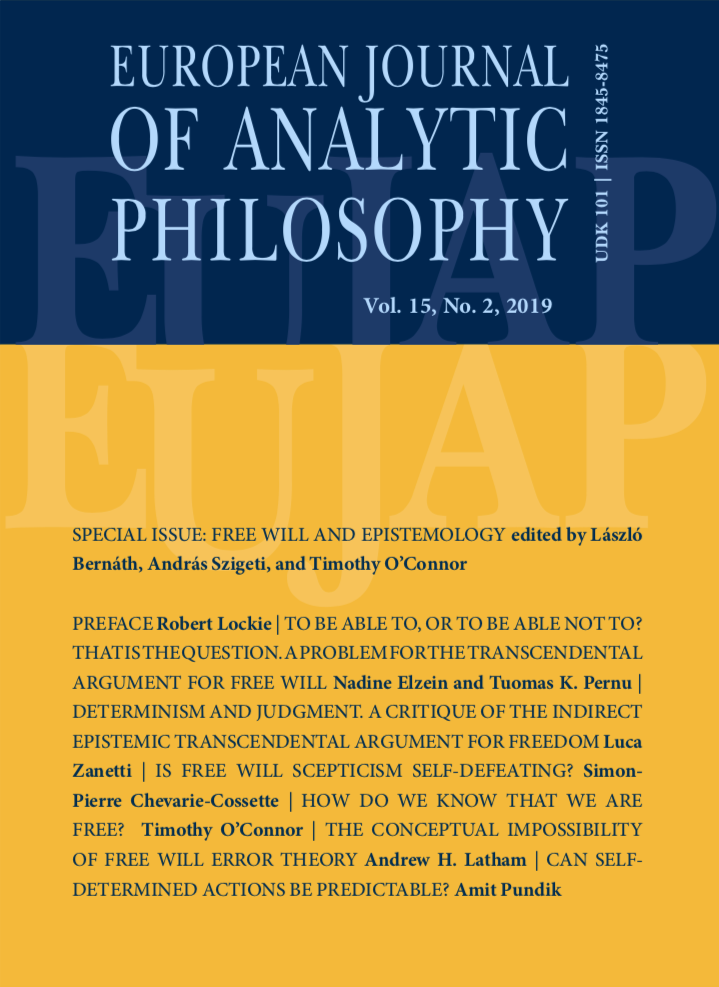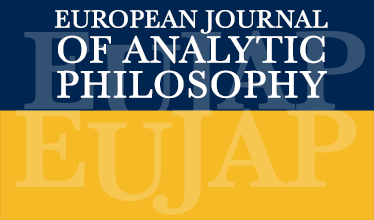About the European Journal of Analytic Philosophy
The European Journal of Analytic Philosophy (EuJAP) is an Open Access journal that supports the values of open science. EuJAP does not charge processing or any kind of production fees to authors of submitted manuscripts.
Since its inception in 2005, EuJAP is published in English twice a year, in printed, as well as in electronic form. Usually one issue is dedicated to a special topic curated by guest editors. Moreover, occasionally we publish invited contributions by distinguished scholars.
Download statistics can be accessed in the Portal of Scientific Journals of Croatia (HRCAK).
Scope
EuJAP is open to a broad spectrum of issues and viewpoints ranging from ethics, meta-ethics, applied ethics, political philosophy, epistemology, ontology, philosophy of language, philosophy of logic, philosophy of mathematics, philosophy of science (and special sciences), philosophy of mind, philosophical psychology, philosophy of action, and philosophy of law.
In particular, this journal aims at providing a forum for philosophical exchange among philosophers from diverse fields within the analytic tradition broadly conceived. For an example of a paper in the analytic tradition and an account of its history, see here. Manuscripts in history of philosophy are welcome, provided that they are relevant for current philosophical debates. We also accept manuscripts in experimental philosophy.
EuJAP also aims at breaking the science/humanities barriers. Thus, its goals include publishing articles that cross traditional disciplinary barriers, either by relying on scientific methodologies, data, and paradigms to ground arguments within a philosophical debate or by using philosophical tools to analyze and illuminate debates that might be deemed as falling outside of academic philosophy.
EuJAP supports equal opportunity and diversity among its authors. Thus, it encourages submissions from researchers from all over the world, regardless of their nationality, race, geographic origin, sex or gender.
Publication and review process
All received manuscripts are pre-refereed by handling editors to check whether they fit the scope of the journal and satisfy journal’s ethical guidelines. Ethical guidleins can be read here. All submitted articles will be checked for plagiarism via software Turnitin. Submissions that pass a preliminary review by the Editors will undergo double-blind review by at least two referees. The Editors seek advice from a large number of expert referees, including members of the network of Editorial Board and its international advisers. Reviewers are given 30 days to provide their feedback on received manuscripts. EuJAP aims to provide the first decision within two months of receiving a manuscript. We divide the decisions into four possible outcomes:
Acceptance/Publish as it is
- The reviewers think that the paper should be published in its submitted form without revisions.
Minor revision
- The paper should be returned to the author with the list of revisions suggested in the comments to the author section.
- Upon receipt of the revised paper, EuJAP editors will directly evaluate whether the revisions are satisfactory or might resend it for evaluation to the reviewer.
Major revision
- The paper should be accepted in principle only and major revisions are recommended in the comments to the author section.
- The paper will be returned to the author with a suggestion to undertake major revision as indicated.
- Along with the revised manuscript, the author(s) should send a separate document detailing how they addressed the worries raised by the reviewers.
- Upon receipt, it is likely that the revised version will be re-sent for evaluation to the reviewer(s).
Rejection
- The submission does not satisfy the scholarly expectations of the European Journal of Analytic Philosophy.
- Reasons for not accepting the submission will be offered in the comments to authors without further consideration for publication.
In case of conflicting reviews, the manuscript might be sent to a third reviewer. In any case, the final decision is made by the Editors. For further information on the review and submission processes, see Instructions for referees that can be read here and Author Guidelines.
As soon as accepted, manuscripts are published online on EuJAP’s official web site and deposited on the Portal of Scientific Journals of Croatia (HRCAK). Moreover, authors of accepted manuscripts will receive a free printed copy of the issue in which their manuscript was published.
Publication ethics
EuJAP subscribes to the publication principles and ethical guidelines of the Committee on Publication Ethics (COPE). For more detailed information see Ethical Guidelines.
Types of manuscripts accepted in EuJAP
EuJAP publishes papers that fall into one of five categories:
Original scientific article
This is the most common type of article published in EuJAP. It represents an original work where new results or arguments are presented in a way that might be considered as providing a novel contribution to a philosophical debate.
Review article
Provides a comprehensive or partial overview of a research problem, domain, or philosophical positions, that have already been covered in other published work. Unlike original scientific papers, review articles are not expected to provide an original contribution to a philosophical debate.
Discussions
Discussions include brief comments that discuss already published work. EuJAP accepts notices that discuss papers published in this journal, but also those published in other venues.
Book reviews
EuJAP accepts reviews of philosophy books typically published within the last three years. Unsolicited reviews of philosophical books are also acceptable. Those who are interested in writing a book review for EuJAP can send us their propsal at eujap@ffri.hr or reach one of the editors.
Critical notices/book discussions
Critical notices are similar to book reviews in that they discuss recently published books. However, critical notices provide a more in-depth analysis and discussions of key ideas promoted or defended in a book.
Original scientific articles and review articles typically pass a double-blind review process. Other types of articles are completely run by handling editors. Critical notices can exceptionally be subjected to a review process by an external referee if the discussion is overly critical or deals with philosophically, scientifically, or socially sensitive issues.


